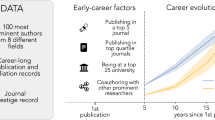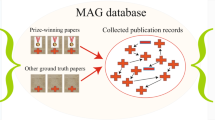Abstract
Science is one of the top interdisciplinary peer-reviewed journals with a very wide audience, and since 1996 it has dedicated a section of its website, Science Careers, to career news and advice. As Science Careers has been active, the academic job market has been transforming, most notably by a decrease in the availability of tenure-track academic positions. Using a dataset of 6111 full-text Science Careers articles we perform an exploratory text analysis to characterize the changes in framing, topics, and scope of career content. We analyzed tag frequency and word frequency to examine topics over time. We tracked the relative prominence of articles that explicitly present advice to the reader, as opposed to more descriptive articles about workforce dynamics or personal experiences of career scientists. We find that although the number of articles tagged Advice had remained consistently high from the inception of the Science Careers section, 2015 marked the beginning of a significant decrease in the number of explicitly tagged Advice articles. The apparent disinclination for strongly prescriptive advice may indicate a growing sense, even within an academic-oriented venue, that career-pathways for researchers have become less predictable, making dispensing broadly applicable advice more challenging.





Similar content being viewed by others
References
Bonaccio, S., & Dalal, R. S. (2006). Advice taking and decision-making: An integrative literature review, and implications for the organizational sciences. Organizational Behavior and Human Decision Processes, 101(2), 127–151. https://doi.org/10.1016/j.obhdp.2006.07.001.
Börner, K., Scrivner, O., Gallant, M., Ma, S., Liu, X., Chewning, K., et al. (2018). Skill discrepancies between research, education, and jobs reveal the critical need to supply soft skills for the data economy. Proceedings of the National Academy of Sciences, 115(50), 12630. https://doi.org/10.1073/pnas.1804247115.
Bourne, H. R. (2013). A fair deal for PhD students and postdocs. ELife, 2, e01139. https://doi.org/10.7554/eLife.01139.
Byars-Winston, A. (2014). Toward a framework for multicultural STEM-focused career interventions. The Career Development Quarterly, 62(4), 340–357. https://doi.org/10.1002/j.2161-0045.2014.00087.x.
Charlton, B. G., & Andras, P. (2005). Medical research funding may have over-expanded and be due for collapse. QJM: An International Journal of Medicine, 98(1), 53–55. https://doi.org/10.1093/qjmed/hci003.
Currie, D. (2001). Dear Abby: Advice pages as a site for the operation of power. Feminist Theory, 2(3), 259–281. https://doi.org/10.1177/14647000122229523.
Cuthbert, D., & Molla, T. (2015). PhD crisis discourse: A critical approach to the framing of the problem and some Australian ‘solutions.’ Higher Education, 69(1), 33–53. https://doi.org/10.1007/s10734-014-9760-y.
Cyranoski, D., Gilbert, N., Ledford, H., Nayar, A., & Yahia, M. (2011). Education: The PhD factory. Nature, 472(7343), 276–279. https://doi.org/10.1038/472276a.
Demarest, B., & Sugimoto, C. R. (2015). Argue, observe, assess: Measuring disciplinary identities and differences through socio-epistemic discourse. Journal of the Association for Information Science and Technology, 66(7), 1374–1387. https://doi.org/10.1002/asi.23271.
Doctorate Recipients from U.S. Universities: 2018 (No. 20–301; Special Report NSF). (2019). National Science Foundation, National Center for Science and Engineering Statistics. https://ncses.nsf.gov/pubs/nsf20301/.
Fuhrmann, C. N., Halme, D. G., O’Sullivan, P. S., & Lindstaedt, B. (2011). Improving graduate education to support a branching career pipeline: Recommendations based on a survey of doctoral students in the basic biomedical sciences. CBE—Life Sciences Education, 10(3), 239–249. https://doi.org/10.1187/cbe.11-02-0013.
Gibbs, K. D., & Griffin, K. A. (2013). What do i want to be with my PhD? The roles of personal values and structural dynamics in shaping the career interests of recent biomedical science PhD graduates. CBE—Life Sciences Education, 12(4), 711–723. https://doi.org/10.1187/cbe.13-02-0021.
Gimenes, M., & New, B. (2016). Worldlex: Twitter and blog word frequencies for 66 languages. Behavior Research Methods, 48(3), 963–972. https://doi.org/10.3758/s13428-015-0621-0.
Gino, F., Brooks, A. W., & Schweitzer, M. E. (2012). Anxiety, advice, and the ability to discern: Feeling anxious motivates individuals to seek and use advice. Journal of Personality and Social Psychology, 102(3), 497–512. https://doi.org/10.1037/a0026413.
Goldsmith, D. J., & Fitch, K. (1997). The normative context of advice as social support. Human Communication Research, 23(4), 454–476. https://doi.org/10.1111/j.1468-2958.1997.tb00406.x.
Hyland, K. (1996a). Talking to the academy: Forms of hedging in science research articles. Written Communication, 13(2), 251–281. https://doi.org/10.1177/0741088396013002004.
Hyland, K. (1996b). Writing without conviction? Hedging in science research articles. Applied Linguistics, 17(4), 433–454. https://doi.org/10.1093/applin/17.4.433.
Hyland, K. (2013). Disciplinary discourses: Social interactions in academic writing. Ann Arbor: University of Michigan Press.
Imre, A. (2017). A logical approach to modal verbs 3. “Must.” Acta Universitatis Sapientiae, Philologica, 9(3), 87–98. (Central and Eastern European Online Library (CEEOL)).
Isaacson, K. J. (2019). Academia-focused PhD curricula fail students’ needs. Nature Human Behaviour, 3(10), 1011–1012. https://doi.org/10.1038/s41562-019-0691-6.
Kaiser, D. (2012). Booms, busts, and the world of ideas: Enrollment pressures and the challenge of specialization. Osiris, 27(1), 276–302. https://doi.org/10.1086/667831.
Larson, R. C., Ghaffarzadegan, N., & Xue, Y. (2014). Too many PhD graduates or too few academic job openings: the basic reproductive number R0 in academia. Systems Research and Behavioral Science, 31(6), 745–750. https://doi.org/10.1002/sres.2210.
Lent, R. W., Brown, S. D., & Hackett, G. (1994). Toward a unifying social cognitive theory of career and academic interest, choice, and performance. Journal of Vocational Behavior, 45(1), 79–122. https://doi.org/10.1006/jvbe.1994.1027.
Lent, R. W., Miller, M. J., Smith, P. E., Watford, B. A., Lim, R. H., & Hui, K. (2016). Social cognitive predictors of academic persistence and performance in engineering: Applicability across gender and race/ethnicity. Journal of Vocational Behavior, 94, 79–88. https://doi.org/10.1016/j.jvb.2016.02.012.
Limberg, H., & Locher, M. A. (Eds.). (2012a). Advice in discourse. Chicago: John Benjamins Pub Co.
Limberg, H., & Locher, M. A. (Eds.). (2012b). Introduction to advice in discourse. In: Advice in discourse. John Benjamins Pub. Co., Chicago.
Maher, M. A., Wofford, A. M., Roksa, J., & Feldon, D. F. (2017). Exploring early exits: Doctoral attrition in the biomedical sciences. Journal of College Student Retention: Research, Theory & Practice, 22(2), 205–226. https://doi.org/10.1177/1521025117736871.
Milojević, S. (2015). Quantifying the cognitive extent of science. Journal of Informetrics, 9(4), 962–973. https://doi.org/10.1016/j.joi.2015.10.005.
Moher, D., Liberati, A., Tetzlaff, J., Altman, D. G., & The PRISMA Group. (2009). preferred reporting items for systematic reviews and meta-analyses: The PRISMA statement. PLoS Medicine, 6(7), e1000097. https://doi.org/10.1371/journal.pmed.1000097.
Mooney, C., & Viskontas, I. (2014, March 28). Scenes from the postdocalypse. Mother Jones. https://www.motherjones.com/environment/2014/03/inquiring-minds-ethan-perlstein-postdocalypse/.
Online Advertising Options | Science Careers | AAAS. (2019). Science Magazine Advertising. https://advertising.sciencemag.org/science-careers/online/.
Perlstein, E. (2014, July 18). Generation Postdocalypse. Trade Secrets: A Blog from Nature Biotechnology. http://blogs.nature.com/tradesecrets/2014/07/18/generation-postdocalypse.
Pitt, R., & Mewburn, I. (2016). Academic superheroes? A critical analysis of academic job descriptions. Journal of Higher Education Policy and Management, 38(1), 88–101. https://doi.org/10.1080/1360080X.2015.1126896.
Roach, M., & Sauermann, H. (2010). A taste for science? PhD scientists’ academic orientation and self-selection into research careers in industry. Research Policy, 39(3), 422–434. https://doi.org/10.1016/j.respol.2010.01.004.
Ruhl, J. B., Posner, S. M., & Ricketts, T. H. (2019). Engaging policy in science writing: Patterns and strategies. PLoS ONE, 14(8), e0220497. https://doi.org/10.1371/journal.pone.0220497.
Sauermann, H., & Roach, M. (2012). Science PhD career preferences: Levels, changes, and advisor encouragement. PLoS ONE, 7(5), e36307. https://doi.org/10.1371/journal.pone.0036307.
Science Careers. (2014, October 24). Science | AAAS. https://www.sciencemag.org/careers.
Small, H. (2018). Characterizing highly cited method and non-method papers using citation contexts: The role of uncertainty. Journal of Informetrics, 12(2), 461–480. https://doi.org/10.1016/j.joi.2018.03.007.
Tolentino, J. (2017, May 18). The personal-essay boom is over. The New Yorker. https://www.newyorker.com/culture/jia-tolentino/the-personal-essay-boom-is-over.
Torres–Martínez, S. (2019). Taming English modals: How a Construction Grammar approach helps to understand modal verbs. English Today, 35(2), 50–57. Cambridge Core. https://doi.org/10.1017/S0266078418000081
Waaijer, C. J. F. (2013). Careers in science: Policy issues according to Nature and Science editorials. Scientometrics, 96(2), 485–495.
Waring, H. Z. (2007). The multi-functionality of accounts in advice giving1. Journal of Sociolinguistics, 11(3), 367–391. https://doi.org/10.1111/j.1467-9841.2007.00328.x.
Acknowledgements
This material is based upon work supported by the Air Force Office of Scientific Research under award number FA9550-19-1-0391. We thank our fellow members of the Science Genome research team at Indiana University for their comments on this work during a team meeting. We also thank the participants and organizers of Common Ground, the Graduate Student conference at the IU Media School for their helpful comments on an earlier iteration of this work.
Author information
Authors and Affiliations
Corresponding author
Supplementary Information
Below is the link to the electronic supplementary material.
Rights and permissions
About this article
Cite this article
Boothby, C., Milojević, S. An exploratory full-text analysis of Science Careers in a changing academic job market. Scientometrics 126, 4055–4071 (2021). https://doi.org/10.1007/s11192-021-03905-2
Received:
Accepted:
Published:
Issue Date:
DOI: https://doi.org/10.1007/s11192-021-03905-2




